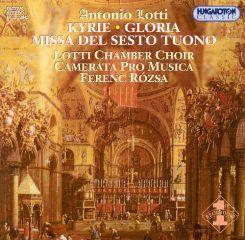Antonio Lotti - Kyrie, Gloria, Missa Sesto Tuono (2002)
Antonio Lotti - Kyrie, Gloria, Missa Sesto Tuono (2002)

01. Kyrie in B major 1. Introduzione 02. Kyrie in B major 2. Kyrie 03. Kyrie in B major 3. Christe 04. Kyrie in B major 4. Kyrie 05. Gloria in D major 1. Gloria 06. Gloria in D major 2. Et in terra 07. Gloria in D major 3. Laudamus 08. Gloria in D major 4. Gratias 09. Gloria in D major 5. Domine Deus 10. Gloria in D major 6. Domine filii 11. Gloria in D major 7. Domine Deus, Agnus dei 12. Gloria in D major 8. Qui tollis 13. Gloria in D major 9. Qui sedes 14. Gloria in D major 10. Quoniam 15. Gloria in D major 11. Cum Sancto 16. Missa del sesto tuono 1. Kyrie 17. Missa del sesto tuono 2. Gloria 18. Missa del sesto tuono 3. Kyrie 19. Missa del sesto tuono 4. Sanctus 20. Missa del sesto tuono 5. Benedictus 21. Missa del sesto tuono 6. Agnus dei Maria Zadori - Soprano Judit Nemeth - Alto Lotti Chamber Choir Camerata Pro Musica Maestro Ferenc Rózsa - conductor
The high point of Antonio Lotti's career came in 1719 when his operas inaugurated the opening of the new opera house 'am Zwinger' in Dresden. They were also as part of the extraordinarily extravagent musical celebrations surrounding the marriage of the Crown Prince and Maria Josepha.
It is symptomatic of the problems concerning the history of music of the early 18th century that doubt exists regarding Antonio Lotti's nationality. He is either to be regarded as German or Italian, with either Venice or Hanover named as his birthplace. Coincidentally it was in Germany and Italy that Lotti undoubtedly had his greatest successes.
Lotti's father Mateo was Kapellmeister at Hanover and presumably provided his early training. By the age of sixteen he was in Venice studying with Giovanni Legrenzi. In 1687 as a singer (alto) he began an association with the Basilica of St. Marks which was to continue until his death. The Basilica of St. Marks, adjacent to the Doges Palace was of central importance to the republic. The doge worshipped in St. Marks on special occasions and sacred music developed to represent his and the republics best interests. His progression involved periods as assistant to the second organist (1690-1692) and second organist (1692-1704). In 1698 Lotti received 100 ducats for the completion of a book of masses. Whilst as first organist (1704-1736) he failed to gain sufficient votes in the competition with Pollarolo and Porpora for the maestro di capella post. Eventually, after three years he gained the position primo maestro di capella after a further competition with Pollarolo and Giovanni Porta. As maestro di capella he earned 400 ducats and free lodging at the Piazza Canonici.
In addition to his duties at St. Marks Lotti also wrote music for the famous female choir, whose training he supervised, based at the Ospedale degli Incurabili, one of the four ospedali in Venice. The other ospedali were the Ospedale della Pieta, the Ospedale dei Mendicanti and the Ospedale dei Derelitti ai SS giovanni e Paolo. The ospedali or 'hospitals' were charitable institutions that provided shelter and accommodation for female orphans. Music making at these institutions was so developed by the beginning of the eighteenth century that noblemen were attempting to secure places for their talented daughters education at these establishments. Antonio Vivaldi was closely associated with the Ospedale della Pieta and composed many concerti for this institution. For Venetian composers and musicians they provided an important source of income.
Lotti composed three operas for the Dresden court, the first, Giove in Argo, was performed on the 25th October 1717 in the Redoutensaal. This opera was also produced in the inaugural performance of the new opera house, am Zwinger on 3rd September 1719 as part of the extravagant celebrations surrounding the Crown Prince's wedding. Lotti's opera Ascanio, ovvero Gli odi delusi dal sangue was performed on the 7th September and the high point of the celebrations was reached by the performance of Lotti's new opera Teofane on the 13th September. [Click here for a fuller description of the wedding celebrations]
In October 1719 Lotti and his wife Santa Stella were the first members of the opera ensemble to leave Dresden. As a souvenir of his visit Lotti kept the carriage and horses that had been given to him for his return trip to Venice. By February 1720 the entire Italian opera ensemble was dismissed under the pretext of a quarrel between Senesino, Berselli and Kapellmeister Heinichen.
After his successful period in Dresden remained in Venice except for one trip outside the city until his death in 1740. ---David Charlton, classical.net
download (mp3 @320 kbs):








